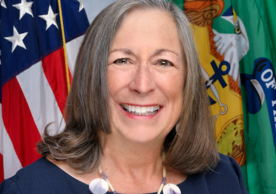
Yale School of Nursing (YSN) Associate Dean for Equity Dr. Angela Richard-Eaglin, DNP, MSN, FNP-BC, CNE, FAANP, CDE® recently connected with Dr. Lynn Malerba ’15 DNP, 18th Chief of the Mohegan Tribe of Indians of Connecticut, to discuss nursing and healthcare topics. In September, Dr. Malerba was sworn in as Treasurer of the United States, the first Native American to serve in the role.
“It was so valuable to talk with Dr. Malerba about how we as nurses and as a school can best support Indigenous communities,” said Dr. Richard-Eaglin. “I was especially interested to learn how we can move beyond land acknowledgements to better align with the strategic goals of Indigenous Peoples.”
Dr. Malerba shared multiple strategies nurses and other healthcare providers can implement to improve the health and outcomes of indigenous people.
“I think the most important thing that any nurse can do is be a loud advocate for good health, and especially for our Native Peoples,” Dr. Malerba said. Her holistic view includes social, community, physical, environmental, and spiritual health.
She also urged providers to add their voices to those of Indigenous Peoples and advocate for a top priority that would have a big impact: budget progress. She pointed out that the Indian Health Service is not well funded and is not considered mandatory in the national budget, but is instead a discretionary item.
“Despite the fact that our Indigenous Peoples have trust and treaty rights to health care, those rights have never been fully executed or fully funded and then fully deployed into Indian country.”
Dr. Malerba described how the Covid-19 global pandemic was especially difficult for Native communities. Now in its third year, Covid-19 has diminished Native life expectancy by seven years, and the challenges to Indigenous communities remain considerable.
“If you don’t have running water, you can’t wash your hands,” Dr. Malerba said. “If you don’t have health care clinics with negative-pressure rooms, you cannot isolate your patients. If you don’t have the Internet, how do you know what safe practices are during a pandemic?
As they deliver care and get to know their patients and communities, Dr. Malerba encouraged nurses, students, and healthcare providers to keep talking, keep asking questions, and keep learning.
“I’m so proud of all the Yale Nursing students,” Dr. Malerba said. “They engage with the global community. They’re not insular—they’re really looking at how do we improve life and how do we improve health for everyone.”
Dr. Malerba maintains a hopeful outlook on the future.
“[These] are hard topics to talk about because it means that we’re acknowledging that we’re not perfect, and perhaps we haven’t always been thoughtful about how we do things. But I don’t think it’s a matter of blaming, I think it’s a matter of always understanding that we can do better, and we will do better.”
For More Information
Dr. Malerba recommended two documents interested readers can consult on these topics:
- The United Nations Declaration on the Rights of Indigenous Peoples discusses indigenous culture around the world and the ability to practice it without infringement. It also discusses the importance of free and informed consent for policies being developed around indigenous people.
- “Broken Promises: Continuing Federal Funding Shortfall for Native Americans,” is a 2018 report from the US Commission on Civil Rights that describes chronic underfunding for federal programs designed to support Native Americans, leaving many basic needs unmet.
Hear the Whole Conversation
To listen to audio of the full conversation, visit the YSN YouTube Channel.
